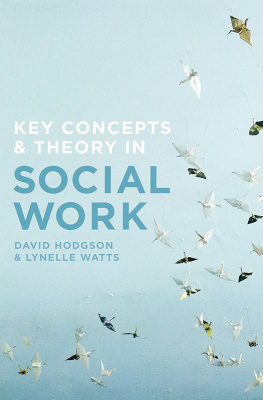First published 1992 by Wildwood House Limited
Published 2016 by Routledge
2 Park Square, Milton Park, Abingdon, Oxon OX14 4RN
711 Third Avenue, New York, NY 10017, USA
Routledge is an imprint of the Taylor & Francis Group, an informa business
Copyright 1992 David Howe
David Howe has asserted his moral right under the Copyright, Designs and Patents Act, 1988, to be identified as the author of this work.
All rights reserved. No part of this book may be reprinted or reproduced or utilised in any form or by any electronic, mechanical, or other means, now known or hereafter invented, including photocopying and recording, or in any information storage or retrieval system, without permission in writing from the publishers.
Notice:
Product or corporate names may be trademarks or registered trademarks, and are used only for identification and explanation without intent to infringe.
CIP catalogue record for this book are available from the
British Library and the US Library of Congress
ISBN 9781857421385 (pbk)
Most general books on social work theory attempt to capture and convey the extraordinary range of ideas that influence social workers and their practice. Social workers deal with people of all ages, some of whom have problems and others who are judged to be a problem. Some troubles feel personal while others are experienced as social, even societal. Environments can help or hinder. Political climates, social policy and welfare legislation change, sometimes content to meet the needs of those who. through no fault of their own. are seen as vulnerable, while at other times policy and practice are keen to encourage citizens to be more responsible for their own welfare and conduct. Whatever the social climate or political mood, social workers are asked to deal with some of the most difficult aspects of the human condition.
If practitioners are to work intelligently and effectively, they need to make sense of people and their social environments. It is not surprising, therefore, that the social work profession has found itself wanting to know about and apply knowledge from the sciences and humanities, sociology and psychology, philosophy and political theory, cultural and religious studies. For both beginner and seasoned hand, this is a daunting challenge. Matters are made worse when it is realised that many of the ideas that social workers come across are in conflict with each other. There is no consensus. Fierce debates take place between those who prefer one view and those championing another. There are those who like the look of science and evidence-based practices and those who think that social work should recognize itself as a pursuit embedded in the world of values and politics. In practice, most social workers limit their knowledge base to a small number of theories and their practice, although they tend to be aware that beyond their own preferences, there is a bigger intellectual picture, albeit one rather distant and perhaps out of focus. The final choice of one or two practice methods might reflect agency constraints, personal preference, or the prevailing ideological climate.
To help social workers find their way around what seems to be an impossibly big world of competing and contrasting ideas, social work academics have had a long tradition of trying to place some kind of order and pattern on the many knowledge bases put forward by enthusiastic advocates of one theory or another. Sometimes these efforts amount to little more than an historical list, but more frequently they offer a conceptual framework that helps explain the logic behind placing this group of theories here and that group elsewhere.
Social theorists have always been good at helping us to understand the debates that surround the nature of social reality, including what we know about people and the societies in which they live. And given that social work is all about people and society it is no surprise that social work theorists have so often turned to philosophers of knowledge and social theorists to help them map and make sense of the profession's ideas and practices. Different models of human nature have exercised the greatest minds over the centuries. These debates, although conducted at high levels of sophistication nevertheless matter to social workers and what they do.
Can people be understood scientifically? If we know how individuals 'work' biologically, psychologically and interpersonally, can we help them by treating their behaviour using behaviour changing techniques? Or are people better understood at the level of an interior, subjective experience? If we view people as unique centres of personal experience, then the humanities might provide a better knowledge base. Certainly, humanism is likely to lead to a very different kind of practice between worker and service user, one which looks for personal growth and self understanding, empowerment and control.
Equally vigorous arguments have occurred about the nature of society and the way we should live together. Included in these debates are views about the origin and value of social order. Social stability, regulation and consensus allow us to live safe and productive lives. Social order is therefore to be valued. Individuals or groups who rock that order threaten everyone's safety and wellbeing. Disturbed and disturbing individuals need to be cared for. cured or controlled. With statutory support and government funding, social workers are expected to play their part in helping citizens function. This perspective believes that one of the roles of social workers is to maintain social order.
However, others are inclined to see many of the problems suffered by people lying in social arrangements that are unfair and unequal. The rich and powerful make the laws that define who is a problem and what kind of behaviours are unacceptable. Dominant groups might discriminate against the weak and vulnerable. Inequalities of resource distribution and opportunities to prosper favour some and not others. Social workers often deal with people on the wrong side of these social, political and economic inequalities. If this is the preferred theoretical outlook, policy and practice might encourage workers to bring about changes in the social, political and economic order. In this perspective, the social order needs to be rocked.
A few years after I first began to teach social work, I came across what I thought was a particularly helpful description of social theory in Burrell and Morgan's 1979 book Sociological Paradigms and Organisational Analysis. Their analysis also included a simple but rather elegant classification of sociological theories that also seemed to work well for more psychologically oriented theories. I immediately set about re-working their classification with social work's theories in mind. And it seemed to work surprisingly well. Rather than teach one theory after another, the taxonomy or classification allows social workers to appreciate the logic that underpins and drives each theory and its associated practice. What up until then had appeared an interesting, busy, but slightly untidy field of study suddenly gained order and clarity.
I taught the re-conceptualized social work theory course for several years. It seemed to be well received. And so with this endorsement. I set about writing the present book based on the lecture sequence. I kept faith with Burrell and Morgan's taxonomy which they had arrived at by cleverly combining the above debates about society and human nature. The first considered human nature along the subjective-objective, science-humanities axis. The second examined society in terms of social order versus social conflict and change.










